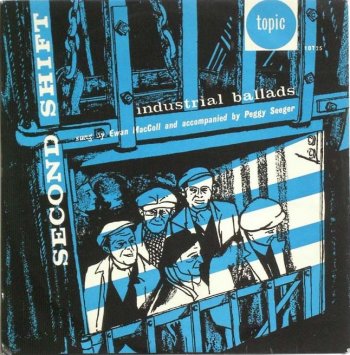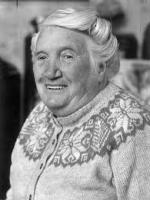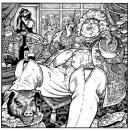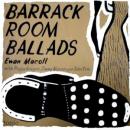Oh, dear me, the mill's gaen fest,
The puir wee shifters canna get a rest,
Shiftin' bobbins, coorse and fine,
They fairly mak' ye work for your ten and nine.
Oh, dear me, I wish the day was done,
Rinning up and doon the Pass is no nae fun;
Shiftin', piecing, spinning, warp, weft and twine,
Tae feed and cled my bairnie affen ten and nine.
Oh, dear me, the warld's ill-divided,
Them that work the hardest are aye wi' least provided.
But I maun bide contented, dark days or fine,
But there's no much pleasure living affen ten and nine.
Oh, dear me, the mill's gaen fest,
The puir wee shifters canna get a rest,
Shiftin' bobbins, coorse and fine,
They fairly mak' ye work for your ten and nine.
The puir wee shifters canna get a rest,
Shiftin' bobbins, coorse and fine,
They fairly mak' ye work for your ten and nine.
Oh, dear me, I wish the day was done,
Rinning up and doon the Pass is no nae fun;
Shiftin', piecing, spinning, warp, weft and twine,
Tae feed and cled my bairnie affen ten and nine.
Oh, dear me, the warld's ill-divided,
Them that work the hardest are aye wi' least provided.
But I maun bide contented, dark days or fine,
But there's no much pleasure living affen ten and nine.
Oh, dear me, the mill's gaen fest,
The puir wee shifters canna get a rest,
Shiftin' bobbins, coorse and fine,
They fairly mak' ye work for your ten and nine.
Contributed by Bernart Bartleby - 2014/11/3 - 10:13
Prima ancora del Ian Campbell Folk Group fu Ewan MacColl a interpretare e rendere popolarissima questa canzone. Il titolo era semplicemente "Oh, Dear Me"
Da "Second Shift", con Peggy Seeger, 1958

Da "Second Shift", con Peggy Seeger, 1958

Bernart Bartleby - 2014/11/3 - 10:25
Language: Italian
La traduzione in Italiano di O Dear Me
O, dear me, the mill is running fast
And we poor shifters canna get nae rest
Shifting bobbins(1) coarse and fine
They fairly make you work for your ten and nine(2)
O, dear me, I wish this day was done
Running up and doon the Pass(3) is nae fun
Shiftin’, piecin’, spinning warp(4), weft(5) and twine(6)
Tae feed and clothe ma bairnie offa ten and nine
O, dear me, the warld is ill-divided
Them that works the hardest are the least provided
But I maun bide(7) contented, dark days or fine
There’s nae much pleasure living offa ten and nine
O, dear me, the mill is running fast
And we poor shifters canna get nae rest
Shifting bobbins(1) coarse and fine
They fairly make you work for your ten and nine(2)
O, dear me, I wish this day was done
Running up and doon the Pass(3) is nae fun
Shiftin’, piecin’, spinning warp(4), weft(5) and twine(6)
Tae feed and clothe ma bairnie offa ten and nine
O, dear me, the warld is ill-divided
Them that works the hardest are the least provided
But I maun bide(7) contented, dark days or fine
There’s nae much pleasure living offa ten and nine
Oh povera me il mulino va veloce
e noi povere cambiste non possiamo riposarci,
cambiare i rocchetti di filato grosso e fine,
ti fanno ben lavorare per i tuoi dieci scellini e nove
Oh povera me vorrei che questo giorno fosse finito
correre su e giù per la passerella non è divertente
cambiare, riattaccare e filare ordito, trama e spago
per nutrire e vestire il mio bambino con dieci scellini e nove
Oh povera me il mondo è suddiviso male,
coloro che lavorano più duramente sono gli ultimi
ma devo ritenermi soddisfatta, con il bello o il brutto, non è molto facile vivere con dieci scellini e nove
e noi povere cambiste non possiamo riposarci,
cambiare i rocchetti di filato grosso e fine,
ti fanno ben lavorare per i tuoi dieci scellini e nove
Oh povera me vorrei che questo giorno fosse finito
correre su e giù per la passerella non è divertente
cambiare, riattaccare e filare ordito, trama e spago
per nutrire e vestire il mio bambino con dieci scellini e nove
Oh povera me il mondo è suddiviso male,
coloro che lavorano più duramente sono gli ultimi
ma devo ritenermi soddisfatta, con il bello o il brutto, non è molto facile vivere con dieci scellini e nove
NOTE
1) Bobbins: spools holding thread
2) ten shillings and ninepence was the pay rate for jute workers before the First World War, in the form of a gold half-sovereign and ninepence
3) Pass: passage between frames or machines in a factory
4) Warp: threads on a loom through which the crossthreads are passed
5) Weft: the crossthreads of a web of material, the woof
6) Twine: twist (into a thicker fibre)
7) stay at, live at, remain
1) Bobbins: spools holding thread
2) ten shillings and ninepence was the pay rate for jute workers before the First World War, in the form of a gold half-sovereign and ninepence
3) Pass: passage between frames or machines in a factory
4) Warp: threads on a loom through which the crossthreads are passed
5) Weft: the crossthreads of a web of material, the woof
6) Twine: twist (into a thicker fibre)
7) stay at, live at, remain
Contributed by Cattia Salto - 2015/2/22 - 00:06
×
![]()
Note for non-Italian users: Sorry, though the interface of this website is translated into English, most commentaries and biographies are in Italian and/or in other languages like French, German, Spanish, Russian etc.









Canzone scritta da Mary Brooksbank (1897-1978), operaia tessile, sindacalista e militante socialista originaria di Aberdeen, Scozia. Membro del partito comunista inglese, negli anni 20 e 30 passò diverso tempo nelle regie galere per via della sua militanza politica. Nel 36 o 37 fu espulsa dal partito per aver detto pubblicamente che Stalin era un brutale fascista e un assassino di massa.
Il testo – ripreso da Mudcat Café – si trova nella raccolta poetica intitolata “Sidlaw Breezes”, pubblicata nel 1966.
Interpretata da moltissimi artisti, a cominciare dal Ian Campbell Folk Group (“This Is The Ian Campbell Folk Group!”, 1963)
“I have never had any personal ambitions. I have but one: to make my contribution to destroy the capitalist system.” Mary Brooksbank.
“The life of the women workers of Dundee right up to the thirties was ... a living hell of hard work and poverty. It was a common sight to see women, after a long ten-hour-day in the mill, running to the stream wash-houses with the family washing. They worked up to the last few days before having their bairns. Often they would call in at the calenders from their work and carry home bundles of sacks to sew. These were paid for at the rate of 5d for 25, 6d for a coarser type of sack. Infant and maternal mortality in Dundee was the highest in the country.” Mary Brooksbank
“From the latter half of the 19th century until the late 1960s, Dundee was the centre of a thriving jute industry, which employed a large segment of the town's labour, adults and children alike. For most of the 20th century women dominated the workforce. Men were due pay rises at the ages of 16, 18 and 21, and employers often preferred to lay men off rather than grant the extra wages. There is some evidence to suggest that men were not keen to adopt the new power looms when they were introduced in the 19th century, and so the employers willingly replaced the workforce with women. This also ties in with the theory that the employers, keen to avoid strike action from the male unions, found women 'more manageable'. It was quite common for a married woman to go out to work at the mill, and for her husband to stay at home, looking after the house and children.
Shifting, piecing and spinning were three jobs of work on the 'flett' - the platform on which the spinning machinery stood. The shifter was the person who removed full bobbins from the spinning frames and replaced them with empty ones. These workers were also called 'doffers' [...]. Some parts of this song are likely to have been taken from an older song. Charlie Lamb heard from his father that 'ten and nine' [ten shillings and ninepence] was the pay rate for jute workers before the First World War, in the form of a gold half-sovereign and ninepence.” (MySongBook)